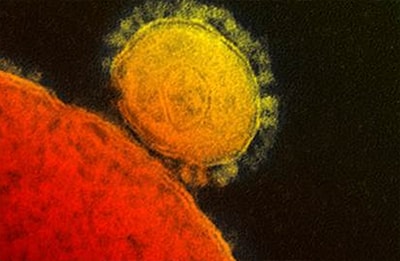
AMD Projects: Identifying the Unknown
Using targeted and metagenomic sequencing to identify and characterize pathogens in unknown respiratory disease outbreaks

New coronaviruses can appear unexpectedly in different parts of the world, causing outbreaks of respiratory illness. Identifying and stopping respiratory threats quickly increases global health security.
Coughing? It could be whooping cough, the flu, pneumonia, or a slew of other respiratory illnesses. Sometimes during outbreaks it’s not so easy for medical or public health professionals to determine quickly what’s causing respiratory illnesses. This is why CDC brings together highly skilled epidemiology and laboratory respiratory experts to form the Unexplained Respiratory Disease Outbreaks (URDO) work group. CDC epidemiologists look at the characteristics of the disease and patterns of an outbreak. CDC laboratory scientists help solve the mystery by identifying the pathogen causing an outbreak. But, there is a problem. Current diagnostic techniques can be slow and not completely informative, slowing down an effective response to the outbreak.
CDC is developing a new tool to help laboratory scientists quickly identify which germ—including new or rare ones—is causing an outbreak. With targeted sequencing analysis, scientists will identify and characterize pathogens in respiratory specimens from URDO responses. They hope to also determine the specific strain responsible for an outbreak and whether or not that strain is resistant to antibiotics.
By using a single method, in this case a testing “chip” containing thousands of short strands of genetic material (primer panels) that help start DNA replication, CDC will be able to identify the cause of a respiratory outbreak faster. This will allow for effective prevention and control strategies to be put in place quickly to protect people’s health.
2017 Project Update
In the first two years, CDC project investigators, with the Massachusetts and Minnesota State Public Health Laboratories, have successfully developed and validated primer panels for 19 bacteria and viruses and various drug resistance markers for Mycoplasma pneumoniae, influenza A, respiratory syncytial virus, and certain strains of Legionella pneumophila and Streptococcus pneumoniae. Researchers implemented a standard process to guide the creation and validation of the remaining 35 primer panels that will be included on the final URDO testing chip. Processes for evaluating and analyzing the complex genetic data generated have also been established to identify which germ or germs are present in samples from multiple patients that are simultaneously tested. Over the next year, these new primer panels and processes will be tested both at CDC and by selected health departments in the United States.
PRINCIPAL INVESTIGATOR PROFILE

Jonas M. Winchell, PhD
Chief, Pneumonia Response and Surveillance Laboratory
Respiratory Diseases Branch
Division of Bacterial Diseases
National Center for Immunization and Respiratory Diseases
Respiratory Diseases Branch
Division of Bacterial Diseases
National Center for Immunization and Respiratory Diseases
Jonas M. Winchell, PhD is the chief of the Pneumonia Response and Surveillance Laboratory within the Division of Bacterial Diseases’ Respiratory Diseases Branch in CDC’s National Center for Immunization and Respiratory Diseases.
Winchell serves as an international and domestic consultant and technical expert on respiratory disease outbreaks that involve pathogens like Legionella and Mycoplasma, among others. He provides technical and laboratory support to determine which pathogen is causing an outbreak, including some that are novel or rare.
Winchell is leading CDC’s efforts to develop new ways to quickly identify these pathogens. Using sequence-based tests, his team of scientists will be able to detect a wide variety of respiratory pathogens, along with their important characteristics such as strain type and antibiotic resistance patterns. He is also overseeing efforts to create a whole genome pipeline for Legionella, which will improve laboratory capacity for identifying outbreak-causing strains of this deadly disease. Both of these projects will help CDC and public health officials better control respiratory disease outbreaks and protect the public’s health.
Winchell completed his Bachelor of Science in physiology and neurobiology, Master of Science in molecular and cell biology, and PhD in molecular and cell biology at the University of Connecticut. In 2013, he was recognized for his work in a Legionella outbreak investigation with receipt of an Excellence in Public Health Protection award from CDC’s National Center for Immunization and Respiratory Diseases. He has co-authored more than 50 scientific publications.


































No hay comentarios:
Publicar un comentario